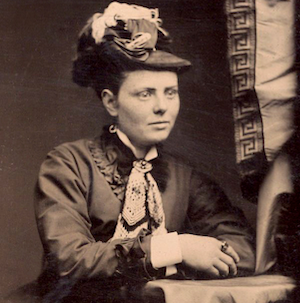Delia Webster: The “Petticoat Abolitionist”
Finding Her True Voice
Delia Webster circa 1858
Delia Webster was an anti-slavery activist who was repeatedly incarcerated and attacked in her efforts to free enslaved people. She operated in Lexington and Trimble County, Kentucky, and become known as the “Petticoat Abolitionist.” Yet, at one point she publicly disavowed being an abolitionist or aiding enslaved people to escape, and she heaped criticism on the North for its role in perpetuating slavery. Why did she state this while she remained very much an abolitionist?
Delia Webster was born in 1817 in Vergennes, Vermont, a known antislavery hotspot. She taught school at the tender age of twelve, and in 1843 she moved to Lexington, Kentucky to establish a female academy. Together with Methodist minister and abolitionist Calvin Fairbank, she was arrested in 1844 for helping Lewis Hayden and his family escape. After a nationally-publicized trial, Webster was found guilty but later pardoned by Governor William Owsley. She returned to Trimble County in 1854, where she purchased (through the help of Northern abolitionists) a 600-acre farm, Mount Orison, overlooking the Ohio River. In Trimble, Webster helped numerous enslaved people escape and was again arrested and subjected to attacks on her property. After the Civil War, she was forced to relocate to Madison, Indiana where she continued her efforts in the Underground Railroad, and also taught children at an African American Baptist Church. She died in 1904 in Des Moines, Iowa.
Webster’s trial and subsequent pardon in Lexington from 1844 – 1845 were sensational at the time, but the division it sowed within abolitionist ranks is now largely forgotten. Webster pleaded not guilty and denied aiding enslaved people. Nevertheless, the proslavery jury found her guilty and the judge sentenced her to two years in prison. The controversy of incarcerating a woman at the time, and Webster’s powerful supporters (namely, Henry Clay) led Governor Owsley to pardon her after six weeks.
January 16, 1845 Courier-Journal (Louisville, Kentucky) announcing Webster’s conviction, with added mockery. Locofocos were a short-lived Democratic Party faction opposed to the party machine.
Upon her pardon, Kentucky newspapers reported Webster declaring
she is not and never was an Abolitionist. She is in favor of Colonization.* She believes the interposition of exterior influence in regard to slavery in Kentucky, is wrong in itself, as well as illegal, and results not merely to the injury of the slaveholder, but to the detriment of the slaves themselves; and seriously retards the progress of sentiment in this State in favor of ultimate emancipation.
Naturally, Webster’s statements confused and angered Northern abolitionists. They noted the contradiction between her denial of aiding enslaved people in Kentucky and her admitting to doing the same while in Boston. Amos A. Phelps, an abolitionist in Vermont who witnessed her previously admit to aiding enslaved people, wrote:
My honest and sober conviction is—a conviction fully expressed to Miss Webster in private, as now in public—that she owes the cause of truth, of the slave, and of Christ a hearty and penitent confession of her wrong; and that she ought never to have the confidence and support of the friends of the slave until she makes it.
The public must feel, and especially the South, that in all matters coming within our own knowledge, our character for the truth is rigorously honest and unbending.
And we ask, with deep concern, if equivocations and deceptions such as those of the present case are to have our countenance or toleration, how long it will be before our very name as abolitionists shall be as distinctive of deception and falsehood as of sympathy for the slave?
Webster returned to Vermont after her pardon and chronicled her ordeal in a book entitled “Kentucky Jurisprudence: A History of the Trial of Miss Delia A. Webster.” In the last few pages, she addressed the controversy:
I have never yet read any publication issued by the Abolitionists.
It is true I denied being an Abolitionist in the sense of Kentucky construction, and I still deny it ; for I am, and ever have been, as bitterly opposed to what is termed “Negro Stealing ;” as Kentuckians themselves.
I believe the zeal of those who would seduce the slave from his master, is altogether misdirected. For though the condition of individual slaves may thus be greatly improved, the chains of thraldom are riveted tighter than before on the remaining thousands, who must still drink the bitter waters of slavery. Nor do I approve any thing which has a tendency to sow discord or to create feelings of animosity between the North and South. I am decidedly opposed to a dissolution of the Union. For I consider the North as deeply implicated in the guilt of slavery as the South and far more inexcusable.
Webster continued:
Though my understanding cannot sanction any interference with the claims of the South or any violation of the rights which the constitution secures to the Slave Holder, my sympathies must ever congratulate the slave who makes his own voluntary and harmless escape. But above all things I would have it done legally and with a sacred regard to the preservation of our union and the Constitution of our beloved Country.
Webster concluded her book with favorable observations of slavery in Kentucky that likely made Frederick Douglass cringe:
The slaves are generally faithful and much attached to their owners who treat them with as much liberality as servitude will bear. True, I have witnessed some of the most heart-rending punishments, but consider them only isolated instances of abuse. So far as I was able to learn, they generally appeared to be well fed—well clothed and cheerful as could be expected.
I am not conscious of any change having been produced in my mind during my residence in the slave states, except that I acquired more sympathy for the slave, and more for his master.
Predictably, Webster’s book was poorly received in the North. Pro-slavery factions exploited this division, evidenced by the November 20, 1845 issue of the Courier-Journal:
What to make of the discrepancy between Delia’s brave private actions and her equivocal public comments? Most clues lead to her father, Benajah Webster.
Benajah Webster, courtesy of Bard and Gina Prentiss.
As soon as Delia was arrested in Kentucky, Benajah made the thousand-mile journey from Vermont —in frail health and in late November —to petition her release. He likely negotiated with Governor Owsley an agreement Delia would disavow abolitionism and publish an account affirming the magnanimity of Kentucky slaveholders. It is difficult to criticize a father doing everything in his power to rescue his daughter—also of frail health—while in prison. Prior to her pardon, there was no guarantee Delia would see another day of freedom—or even survive the ordeal.
It is easier, however, to criticize Benajah’s insistence that she publish a book undermining abolitionism, minimizing Kentucky slavery, and denying her daughter’s true character. In a letter Fairbank wrote to William Lloyd Garrison’s Liberator, he claimed there was a one-month dispute between Benajah and Delia over the contents. Fairbank added, “Her book was written under the influence and direction of her father.” Tellingly, the title page to her book includes a quote from Shakespeare’s Othello:
He that filches from me my good name
Robs me of that which not enricheth him
And makes me poor indeed.
This was undoubtedly a thinly veiled protest. The book muddled her message to the world, and it would take a decade for her actions to reveal her authentic character.
In truth, Webster performed her abolitionist work amidst grave threats to life and property. Unlike Underground Railroad conductors in free states, she faced immediate suspicion for her actions, and she did not enjoy a safety net of abolitionists, Quakers, and other antislavery communities. While she operated in Trimble County in the mid-1850s, she encountered multiple angry mobs on her property demanding she leave Kentucky and threatening assassination and destruction of her farm. She continued to run Mount Orison, but increasingly did so remotely through tenants. Over the next decade, arsons burned down twenty-one buildings at Mount Orison, including four barns. In 1866, despite slavery’s demise, a mob slaughtered most of her animals and destroyed her crops. Ultimately, Webster moved back to Madison—but not before helping over twenty enslaved people escape.
Despite the initial controversy and confusion, there is no mistaking Delia Webster as an indomitable nineteenth century woman who, through an iron will, led countless enslaved people to freedom. Her accomplishments are more remarkable given she charted her own destiny from an overbearing father who, at least initially, masked her true character and voice. Despite Delia Webster’s trials and tribulations in Kentucky, she now appears in a watercolor painting on permanent display in the Kentucky state Capitol—an enduring testament to her bravery and heroism.
Delia Webster watercolor, courtesy of Kentucky Commission on Women.
Learn more about the exemplars of Trimble County, Kentucky in the upcoming book Almost in Reach of Fame: Joseph B. Stewart, the Bourbon Giant who Chased Lincoln’s Assassin and Caught Scandal.
Notes
Delia Webster’s activities in Lexington, Kentucky were concurrent with Joseph B. Stewart’s studies at the Transylvania Law School nearby, and her Mount Orison farm in Trimble County was a few miles from where Stewart was born and raised. Trimble was also where Henry Bibb escaped in 1842 and became a colleague of Frederick Douglass.
* Henry Clay, who Webster spoke fondly of, and who supported her pardon, was the founder of the American Colonization Society. The Society advocated the removal of slaves to colonies throughout Africa and Central America, rather than emancipation and integration within the United States. President Lincoln supported colonization in addition to emancipation given the former was more palatable to the South. Abolitionists, however, detested the notion Blacks were inferior and could never live peaceably with whites. Frederick Douglass did not mince any words: “Shame upon the guilty wretches that dare propose, and all that countenance such a proposition. We live here—have lived here—have a right to live here, and mean to live here.” Notably, Webster did not address colonization in her book, and her views on the issue are unknown.
Sources
Randolph Paul Runyon, Delia Webster and the Underground Railroad (Lexington, Kentucky, 1996).
Delia A. Webster, “Kentucky Jurisprudence: A History of the Trial of Miss Delia A. Webster” (Vergennes, Vermont, 1845).
Courier-Journal (Louisville, Kentucky), Jan. 16, 1845, p. 2.
“Delia A. Webster Pardoned,” Courier-Journal, Feb. 26, 1845, p.3.
Courier-Journal, Nov. 20, 1845, p. 3.
“Miss D. A. Webster’s Defense,” Green Mountain Freeman (Montpelier, Vermont), Jan. 22, 1846, p. 2.
“Colonization,” North Star (Rochester, New York), Jan. 26, 1849, p. 2.





